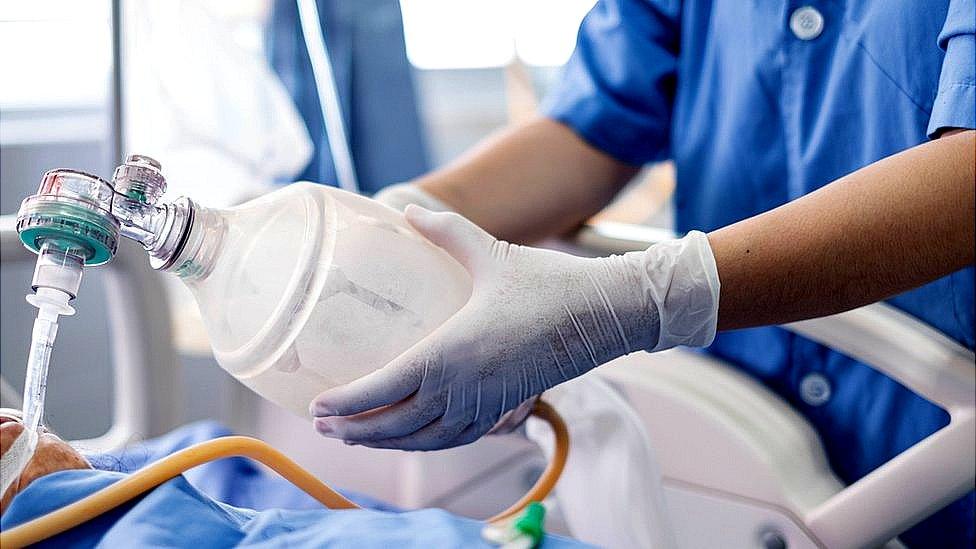Coronavirus: Doctors face agonising life-death decisions
- Published

Doctors are being told that, as the coronavirus pandemic spreads, they will face "agonising choices" over who gets potentially life-saving treatments.
The British Medical Association, external has issued ethical guidance for those working on the front line.
The professional body says there needs to be an urgent public debate about the issue in these "unprecedented times".
It warns that despite "heroic efforts" to boost capacity, the NHS may be overwhelmed.
The government has ordered thousands of ventilators to help ease the pressure on hospitals caused by the coronavirus crisis.
These, along with specialist life-support machines called ECMO (Extra Corporeal Membrane Oxygenation), will be needed for the sickest patients to aid breathing and, when possible, save lives.
Deciding who gets what care
Doctors have to make difficult choices about treatment in their everyday practice, but the coronavirus outbreak means they will have to make life-death decisions more often and sometimes based on capacity rather than just need, the BMA is warning.
The guidelines say:
All patients should be given compassionate and dedicated medical care, including symptom management and - where patients are dying - the best available end-of-life care
Nevertheless, it is legal and ethical to prioritise treatment among patients. This applies where there are more patients with needs than there are resources available.
When resources are too scarce and choices have to be made about who to treat, doctors are urged to consider:
Severity of acute illness
Presence and severity of co-morbidity
Frailty or, where clinically relevant, age
The BMA says managers and senior doctors will set "thresholds" for admission to intensive care units - the places where the most sick will need treating with ventilators.
By itself, infection with coronavirus should not guarantee priority for treatment, it says.
Patients whose "probability" of dying, or requiring prolonged intensive support, exceeds the set threshold would not be considered for intensive treatment. They should still receive other forms of medical care, says the advice.

A SIMPLE GUIDE: How do I protect myself?
AVOIDING CONTACT: The rules on self-isolation and exercise
LOOK-UP TOOL: Check cases in your area
MAPS AND CHARTS: Visual guide to the outbreak
VIDEO: The 20-second hand wash

Dr John Chisholm, chair of the BMA's medical ethics committee, said: "The headlines are stark: a 'tsunami' of Covid-19 patients moving inexorably toward London's hospitals and then heading to the rest of the UK.
"Despite heroic efforts to increase supply - and reduce demand - there may come a point where the pandemic will simply overwhelm intensive care beds, ventilators, ECMO life-support.
"As all working on this know, guidance, essential as it is, does not preclude the need to address these enormously challenging ethical questions.
"Guidance can indicate how to proceed. It cannot stop the choices being brutal or relieve decision-makers of their moral distress."
He added: "Looking ahead to the coming weeks, if hard choices are required, we know they will be contested. There will be anger and pain.
"People who, in normal circumstances, would receive strenuous treatment may instead be given palliation in order to favour those with greater likelihood of benefiting. Nobody wants to make these decisions, but if resources are overwhelmed, these decisions must be made."
Medical ethicist and barrister Daniel Sokol said: "While the guidance highlights the ethical issues and dilemmas doctors will face, it will leave some puzzled and perhaps frustrated about how to apply the principles in practice.
"The guidance recognises that a challenge may be that large numbers of people requiring intensive care are likely to be equally suitable for it.
"But it doesn't give a clear answer to how doctors should select among this large group."
- Published29 March 2020

- Published26 March 2020
